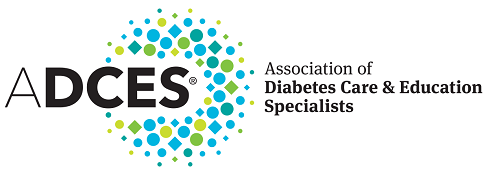
Welcome to the ADCES Media Center
Find the latest information from reputable sources for your news stories about diabetes care and education.
Media Relations

ADCES Media Center
The Association of Diabetes Care & Education Specialists is home to experts on various topics related to diabetes care and education. We welcome the opportunity to provide you with sources and resources about what we do and the impact we have on people with diabetes and the healthcare system.
Media Contact
For more information, contact Danielle McNary in ADCES® Media Relations at 312-601-4805 or [email protected].
Talking About Diabetes
Language & Diabetes in the Media
How we talk about diabetes in the media has an impact. Using descriptive and non-judgmental language when talking about diabetes or about people with diabetes can make a positive difference. If you’re a member of the media, please take a moment to review these suggestions when covering stories on diabetes.
Quotes From Diabetes Spokespeople
Get expert commentary, story ideas and background information on the full range of prediabetes, diabetes and cardiometabolic related topics from ADCES volunteer diabetes spokespeople. If you’re writing an article on any of these subjects, consider interviewing one of our qualified diabetes care and education experts.
ADCES & Diabetes in the Media
Learn more about ADCES’s contributions, activities and events surrounding the education, management and prevention of prediabetes, diabetes and related cardiometabolic conditions in our latest news releases.
Organizations Urge Congress to Pass Bills to Increase Access to Nutrition and Diabetes Care
July 23, 2024
CHICAGO – Medicare falls short for millions of Americans with serious, chronic medical conditions because of barriers to nutrition and diabetes care and services. Older Americans, especially those from racial and ethnic minority populations, are missing out on low-cost, high-value services that reduce the need for medications, enhance their efficacy and improve health and wellbeing. The Academy of Nutrition and Dietetics (the Academy) and the Association of Diabetes Care & Education Specialists (ADCES®) call on Congress to pass legislation that would reduce the burden of diabetes and other chronic disease for Medicare beneficiaries and for the nation.
The Academy and ADCES have joined forces today on Capitol Hill to champion the Medical Nutrition Therapy Act and the Expanding Access to Diabetes Self-Management Training Act. Diabetes self-management training (DSMT) and medical nutrition therapy (MNT) are clinically effective services that ensure Medicare beneficiaries receive necessary care to live healthy lives.
Medical nutrition therapy provided by a registered dietitian nutritionist is essential in the diagnosing and interventions for diet-related chronic diseases, including diabetes. For example, seniors with prediabetes who need more than basic community education cannot access MNT when they begin to show signs of developing the disease; however, once diagnosed with diabetes, they have access to care provided by registered dietitian nutritionists to learn how food intake impacts health, missing the opportunity to prevent a chronic disease. The Academy stands next to our colleagues from ADCES to advocate for these bills that would positively impact the health of older adults, especially those from racial and ethnic minority populations.
“Diabetes self-management training is an interdisciplinary service provided by nurses, dietitians, pharmacists and others on the health care team to equip people who have diabetes with the skills and knowledge needed to manage their disease,” said ADCES President Jane K. Dickinson, PhD, RN, CDCES. “As someone who has had Type 1 diabetes for 49 years and worked in diabetes care and education for nearly 30 years, I can attest to the power of this service in empowering people with diabetes to engage in their self-management, which leads to improved health and fewer diabetes-related complications.”
“The Congressional Budget Office recently found that the cost of increasing the utilization of DSMT is at least partially, if not more than fully, offset by savings from reduced use of acute-care services,” continued Dickinson. “It has never been more clear that now is the time to increase access to this low-cost, high-efficacy service in Medicare.”
The Academy and ADCES thank U.S. Senators Collins and Peters, and U.S. Representatives Kelly and Kiggans for their ongoing commitment to improving the health of the nation and their support for access to medical nutrition therapy as sponsors of the MNT Act of 2023. The organizations also thank U.S. Senators Shaheen and Collins, and U.S. Representatives Schrier, Bilirakis, and DeGette for championing the Expanding Access to Diabetes Self-Management Training Act of 2023, an important step that would ensure those living with diabetes have the resources and tools needed to actively manage their health.
###
About the Academy of Nutrition and Dietetics
Representing more than 112,000 credentialed nutrition and dietetics practitioners, the Academy of Nutrition and Dietetics is the world's largest organization of food and nutrition professionals. The Academy is committed to improving the nation's health and advancing the profession of dietetics through research, education and advocacy. Visit the Academy at www.eatright.org.
About the Association of Diabetes Care & Education Specialists
ADCES is an interdisciplinary professional membership organization dedicated to improving prediabetes, diabetes and cardiometabolic care through innovative education, management and support. With more than 12,000 professional members including nurses, dietitians, pharmacists and others, ADCES has a vast network of practitioners working to optimize care and reduce complications. ADCES supports an integrated care model that lowers the cost of care, improves experiences and helps its members lead so better outcomes follow. Learn more at www.adces.org.



Leave a comment